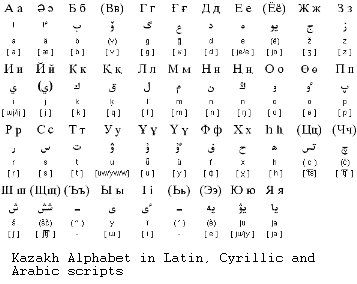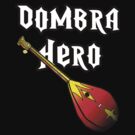Kazakhsha

from http://www.omniglot.com/writing/kazakh.htm
A number of issues regarding Kazakh language have come out recently. First, there was the announcement on the 24th of October that Kazakhstan will switch to the Latin alphabet, whereas now it uses a Cyrillic alphabet. Historically, Kazakh was originally written in a Turkish script and then in Arabic script, and briefly in Latin script before Russian colonization and assimilation in the Soviet Union. So the move has some historic roots. Many blogs have taken up the issue of the new alphabet, and I was going to sum them up, but as I’m writing this, I got scooped by NewEurasian Live Journal, so I’ll just link to their summary here. Great minds think alike!
I will post directly to this blogger’s informal transcription proposal with examples, because it’s fun to look over.
Uzbekistan moved to a Latin alphabet for Uzbek after independence, which many viewed as a move to assert independence from Russia and the Soviet past. Kazakhstan may be making a similar stand. In the end I suspect it is a move toward making it easier for both foreigners to learn Kazakh (and make it a more “friendly” language), and for Kazakhstani to learn English.
The current thinking in the government is to produce a tri-lingual nation and new textbooks for kids have come out recently, including one called The Kingdom of Three Languages which teaches Kazakh, Russian, and English through the adventures of two Kazakh brothers, a Russian boy, and a British girl.
Recently, at the meeting of the Assembly of the People of Kazakhstan, Nazarbayev said that civil servants who do not speak Kazakh will be out of a job. This comes in the midst of ministries switching to Kazakh as the language of memos and internal letters. Also, the President announced that there will need to be new words in Kazakh for scientific and technical terms, so that Kazakhs are not just borrowing Russian or English words. This creates a great deal of prestige for Kazakh, but does make it harder for non-speakers—this non-speaker relies heavily on borrowed words to understand things in Kazakh.
Rumors persist that having Kazakh is a great advantage in the market, and in fact, there were plans to have a test of Kazakh language for all candidates for the prestigious Bolashak Scholarship. Presidential candidates do have to pass a Kazakh language test, scrapped out of fear it would isolate non-Kazakhs. There was also the recent scandal over the new tenge, on which the word Bank was misspelled in Kazakh, which led many to wonder, “Who are these shmucks in Astana who can’t speak Kazakh?” Some of those shmucks wonder, “Who are these nationalist jerks to force me to learn a new language?”
In fact, many young and successful Kazakhs in the cities do not speak Kazakh. In Soviet times, Russian-language schools were given more resources and their graduates did better, leading many parents to send their kids to Russian-language schools. In part from historical habit and in part because Kazakh lacks scientific terms, and since Russian is an international language, publications, textbooks, translations of Western books are more likely to be in Russian than Kazakh. Also, many up-and-coming students chose to focus on English or another foreign language instead of learning Kazakh. So you end up with a population that doesn’t speak Kazakh and doesn’t see any need to speak Kazakh (and I note that there are many exceptions to this rule). In fact, some people say with pride that they do not speak Kazakh. At the same time, I was sitting with some friends who work at a Ministry who has already made the switch to Kazakh as the working language. All of them were Kazakh and they were joking that only one of them can speak Kazakh—and very basic Kazakh at that. There was a palpable feeling of shame among them.
In the capital city, here in the historically Russian dominated north, it is not uncommon to hear people on the street speaking Kazakh. It is not uncommon for a store clerk to greet me and serve me in Russian, then turn to the Kazakh behind me and address him in Kazakh. In the south, they say, even Russians speak Kazakh because it’s so widely used.
It’s a tight rope that Nazarbayev and the nation are walking. On the one hand, this is Kazakhstan—land of the Kazakhs. There is a nationalist argument to be made, that Russians and Ukrainians are guests here and should learn the language. On the other hand, Kazakhstan prides itself on being a land of ethnic diversity where 120 nationalities. Unlike other melting pot countries such as the US or France, where one culture and one language has dominated, in Kazakhstan the native culture and language have been suppressed for over 100 years. Professor William Fierman at Indiana University makes an interesting parallel between the Soviet philosophy of nationhood and the situation Nazarbayev finds himself in (Ab Imperio Feb 2005). The USSR found itself in a double bind of trying to prove that all cultures of the Soviet Union were benefiting from Socialism and at the same time to demonstrate that a Homo Sovieticus, a socialist man and culture was being formed, and that it was strong! Similarly, the Kazakh government wants to juggle Kazakhstan as a multi-ethnic tolerant land of diversity and on the other hand, to emphasize that it is the land of the Kazakhs. As I’ve noted here before, one of the main reasons for developing a new shining capital, is to unite a people around a symbol that is not associated with any one ethnicity or nationality.
In fact, many Kazakhstani feel a strong tie to Russian culture, brought to them as Soviet culture, and thus as the culture of their childhood or the “good old days.” Soviet actors and artists are referred to as “ours.” Beef stroganoff, goulash and borsch are standard foods in cafes and restaurants. On New Years, people still tune in to watch the Kremlin clock turn to midnight, and New Years is still the most popular holiday in Kazakhstan. Old Soviet holidays are still noted by people, if not celebrated officially. On the other hand, Nauryz, the Muslim New Year, somewhat celebrated by Kazakhs before the Russian colonization, was introduced from above (though very enthusiastically taken up!).
Fierman cites a Kazakh nationalist who in 2004 came down against a Kazakhstani nation (as opposed to a Kazakh-only nation) on the grounds that Russian language and culture were too strong and would dominate any kind of unified, diverse culture. Koishybayev supported waiting until Kazakh culture was strong enough to form the core. Which provides an interesting model, one that most modern nations pursue, of a core dominant culture which nevertheless provides a space for other cultures to live and flourish.
At the moment, the situation seems to almost resemble the US where English is the dominant language but spaces exist for speakers of other languages—regions exist where all signs and advertisements are in Spanish (or Chinese or Russian!), official forms are often provided in different languages, etc. The issue is that in this analogy, Russian is the dominant language and Kazakh speakers are being accommodated. Can this situation be overturned to the point where both languages share equal footing? Possibly, with the provision of strong educational materials in Kazakh, and with the government not simply ordering people to use Kazakh, but also providing support—classes in Kazakh for government workers, educational television shows. Some of this is being done. More needs to be done, particularly targeting non-Kazakh Kazakhstani.
One suggestion that might be taken up is one Professor Fierman made to me: entertaining television shows for kids (something like Seasame Street I suppose, which Russians, Ukrainians, Germans will want to watch. And while they watch babushka will also be watching, and learning!
Also widespread advertisement of the fact that nothing warms a Kazakh’s heart than when a non-Kazakh speaks it. I even got free milk once by calling it sut!










First off one of the best written posts I have read on your site. I could write or video blog about this subject (wait I did) but I’ll just respond with one of the best moments I remember riding the city bus in Almaty (there’s not a lot.) It was a 6-7 year old ethnically Russian boy going threw numbers 1-20 in Russian , Kazakh and English. And my wife and I both laughing as she was helping him by mouthing the Kazakh numbers and I the English.
I think it is a good sign, anyway, kazakh people start us an omni language all over this world, I will apply Latin alphebet for my site kazakh version soon.
I must comment again, because i comment this afternoon in a rush.
Kazakh people exists with a great culture, and Kazakha is great enough for people who live at Kazakhstan! And people who live at Kazakhstan should be proud of speaking Kazakh!
It is not a issue about nationality, it is just a problem about one omni kazakh language! The national language for Kazakhstan.
Only the stupid gays relate it with a political thing, it is a culture requirement.
You can not ask Arabe to speak American English!? Right? People live in Arab should speak Arab, Even they are from Sun!
More Kazakh Culture please refer to http://WWW.BULAKH.COM, by the way, i can explain a kazakh word for you, “Bulakh” means the original, meta things.
Keep it in mind please! Fight against any culture breaker! http://WWW.Bulakh.com will save Kazakh Culture and fight against and acts which ruined Kazakh Culture!
When you drink water from a well when you feel too thirsty to die, DONT SPIT ON THE WELL!!!!!
When you Live Kazakhstan, please dont attack Kazakh Culture!
Kazakh people who dont speak Kazakh is called as “Mankurt”, it is historical words, a poor kazakh in the history, who is caught by the enemy and leave under the sunshine with a fresh skin wrapped on his head, when drought, it became tight and tight, finally , drive him crazy, and the enemies drive him (who lost mind) to kill his mother! THAT IS MANKURT, WHO LOST KAZAKH WORD FROM HIS POOR MIND!
I’m an azarbayghani ( azerbaijani ) from south ( Tabriz ) and this is my opinion :
kazakhstan is land of kazakhs and there is no place to russian .
mankurt is a very suitable word for naming kazakhs that speak russian ( we use this word in tabriz for calling peoples who speak farsi ) .
Qazaqistan Qazaqlarin topraghi dir bu topraghda rus dilina hech bir yer yokh .
yashasin islam birligi .
yashasin turk birligi .
اعتصموا بحبل الله و لا تفرّقوا
I still don’t see why the language should be the first and foremost measure of whether someone is Kazakh or not. I know one guy who can ride a horse, do dzhigitovka, build a yurt and so on, but he doesn’t speak much Kazakh because in Soviet times there were no Kazakh schools near him. How can you call such a man a fake Kazakh, but someone who doesn’t know any Kazakh history or traditions, but speaks Kazakh well is a true Kazakh?
I don’t agree with you. I think this is a misconception of the nation-state concept.
There are several cases of countries speaking someone else’s language or whose national language is in a weaker position than other foreign ones, but which have a NATION.
In Switzerland, for instance, four languages are spoken. None of this (apart from Reto-Romantsch or Ladin, which is spoken in some valley of Eastern Switzerland) is a Swiss indigenous language. There is no Swiss language, but there is a Swiss nation, because the Swiss people, regardless of their language, have a history and a culture in common. An Italian-speaking Swiss from Lugano is not Italian at all (and it shouldn’t be surprising if they don’t support the Italian national football team, for instance).
In Ireland, English is far more spoken than Gaelic, but an Irish who speaks only English is still Irish. Because, unlike most Englishmen, Irish people are Catholic. And the same is still worth, for instance, talking about English-speaking people of Malaysia or Singapore. They are not Englishmen at all, even when they speak English fluently, because their culture is completely different.
I think that Kazakhstan is not in such a condition to say its citizens to give up speaking Russian and to make Kazakh mandatory for everything. It would lose a lot, both in terms of people (it would lose many of the most-trained people, and a brain drain is not exactly what a developing nation needs) and of ethnic stability. It would be better to stress the fact that “we can speak Russian fluently, but we are Kazakhstani, not Russians”.
This is an interesting point. What makes a state a state and a nationality a nationality?
People live in Kazakhstan are learning Kazakh language, it is a good sign, you can seen the latest Asian Winter Game, what they are speaking? Kazakh language, no matter what kind of disaster a nationality like Kazakh ever faced to, People like Kazakh will win finnally and protect their culture from beening ruined!
Very interesting topic. As an American who has lived in west Kazakhstan for about a year I was initially very shocked at the amount of Kazakh spoken here, lack there of should I say. My wife’s family (I am a qyubala) although city dwellers for several years are originally from small towns and villages and all speak excellent Kazakh and were quite excited when I began learning the language. Between my wife, a peace corps resource I found on the web, a great Kazakh textbook and practice I get in the city I have become pretty proficient.
What frustrates me from time to time is when I speak Kazakh, I am usually responded to in Russian by Kazakhs. Now I know they understood me because they answer accurately but it is a bit weird. A view times this has been witnessed by an older Kazakh will proceed to lecture the cashier who replied to me in Russian. My wife had to explain to me a few months ago that people are just so predisposed to Russian in the city, furthermore, she said that I have to accept the possibility that at this point I know more Kazakh than some Kazakhs.
Anyway, I am learning Russian by osmosis so in the end it is all good.
Great blog by the way, just stumbled across it and I cannot believe that I have not found it before.
This is a habit from the pre-soviet time, people living in ussr be forbidding learning&speakin russian and do not allowed to speak their own mother tongue.
Just be patient, dude, everything will be ok, just see the latest Asian Winter’s Game, people there all speaking Kazakh Languages!
Good Sign, Good Sign, Good Sign, “Zhasa Kazakh”, “Algha Kazakh”
“Also widespread advertisement of the fact that nothing warms a Kazakh’s heart than when a non-Kazakh speaks it. I even got free milk once by calling it sut!”
Lol, I had to laugh at this. I am on the only person at the supermarket who gets their groceries put in a bag for them, the check out girls love that I use Kazakh with them. Even the taxi drivers will consent to giving me a locals rate.
Dude, It is very kind you are learning Kazakh Language, it is good way to understand Kazakh Life, Kazakh people are keep protecting Kazakh Culture from disappearing from the world culture.
You do the right thing, help human being to save an gorgeouse culture, Kazakh Culture!
Keep Learning Kazakh Language, and help saving Kazakh Culture, you will be paid by Alla or God or Somebody else:)
Great post! Thank you for informing us about the linguistic situation of Kazakhstan, this is precisely the kind of info I was looking for. Just one correction: the festival of noruz predates the birth of Islam :).
Keep up with the good work!
True. I should have qualified that it’s an ancient Persian holiday. But I believe it came to the Kazakhs via Islam and it is widely called the Muslim New Year by Kazakhs themselves.
It is widely celebrated in Central Asia, which was part of the Iranian sphere of cultural influence, so I thought it predates Islam there as well. Definitely we have to make research about this topic! You made me curious :). Which calendar is used in Kazakhstan? In Iran the calendar used is named solar hejri, that is, it is not a lunar calendar but it starts in the year of the scape of the Prophet to Medina.
Btw, I <3 your profile picture (Dombra hero!).